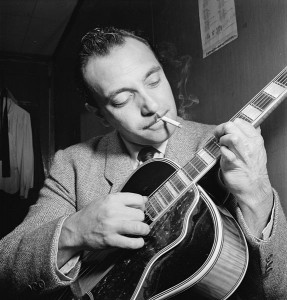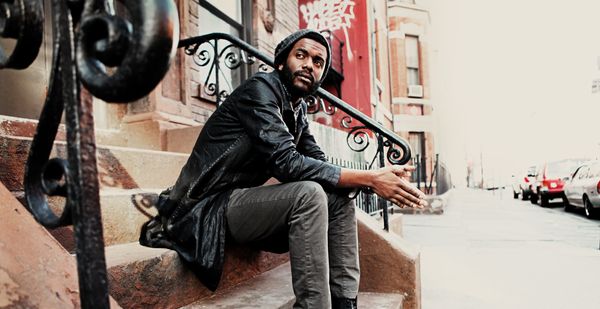As one of the virtuoso jazz guitarists, Jean Baptiste ‘Django’ Reinhardt had many particularities. He was born in a caravan in 1910. His mother ‘La belle Laurence’ was a dancer and acrobat in a wandering Sinti group. His father Jean-Eugène Weiss, a musician, left mother and son only few years after. They called him by the nickname of Django – ‘I awaken’. He liked his red socks with the black suit. He loved his pet monkey. And he was about as renown for his pool billiard and gambling as for the musical skill. Faring from Belgium to North Africa he did not visit any school, did not read or write. Things changed with the more permanent residence at the ‘Porte de Choisy’ in the Paris periphery.
It was there that he skillfully learned to play the banjo, violin and guitar. It was there that he earned his first musical acclaim. It was there that he almost lost two fingers of his left hand and his left leg in the flames of a burning caravan. And it was there that he perfected his particular two finger plus thumb technique as a consequence – playing even as a Django ‘in chains’, breaking free.
With the French violinist Stéphane Grappelli he shared the passion for American jazz and swing. And with the Quintette du Hot Club de France they co-founded an innovative eyclusively string jazz band. One of the few European jazz groups with great popularity in most of Europe and the US at the time, they perfected their jazz manouche. Repeatedly being featured by touring masters like Coleman Hawkins, Louis Armstrong, Duke Ellington and their kind.
He has inspired many. Together with Stéphane Grappelli he contributed numerous masterpieces. One of them being the controversial Marseillaise interpretation Echoes of France recorded upon their reunion in London after WW II in 1946. Perceived as ‘offensive’, French authorities decided to censor and ban this piece for ten years. New chains. Maybe he was an outlaw. Reinhardt-inspired title and story line of the 1966 Italian Western film Django seem to suggest the same. They also served as a starting point for Django being ‘unchained’ just recently. Sixty years after his premature death. And almost fourty after he broke loose. All this time his music has prevailed. Just like the Sinti in the Paris outskirts.

